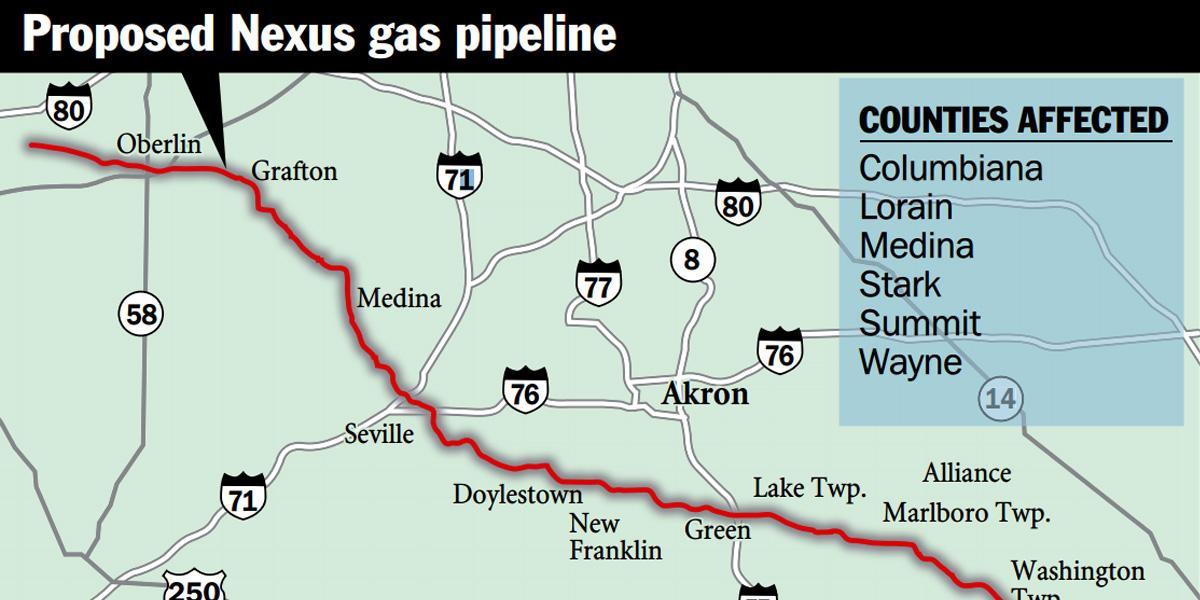

The battle over the controversial Nexus pipeline is heating up. Following a city council vote on Tuesday, the city of Green in Ohio will be spending $100,000 to hire an environmental law firm in Cleveland to stop its construction, the Associated Press reports.
Canadian pipeline operator Enbridge and Detroit’s DTE Energy plan to build the high pressure, 36-inch natural gas transmission line through 8 miles of the middle-class community.
But the city of Green, located in northeast Ohio between Akron and Canton, has been working hard to stop the project. Just a few weeks ago, city council donated $10,000 to another group preparing its own lawsuit over the Nexus pipeline.
According to Green’s Planning Department, the pipeline encounters a large wetland as it enters the city, crosses nearly three streams for every mile and would be in close proximity to homes. The route would also cross a large agricultural farm that is being considered for future residential development.
A widely-opposed pipeline 'confirms worst fears' after two spills into Ohio wetlands: https://t.co/0CaYLLQHKG via @EcoWatch
— NRDC 🌎🏡 (@NRDC) April 21, 2017
An analysis from Cleveland State University calculated that Green stands to lose $52 million over the course of 50 years due to the project, mostly due to a loss of income tax.
The route also travels near or crosses several of Green’s 10 city parks. Mayor Gerard Neugebauer told the AP that he could not allow families to use parks inside the estimated 1,500-foot blast zone a pipeline explosion could create.
The city previously proposed an alternate route that would move the pipeline south into farmland but the Federal Energy Regulatory Commission (FERC) ruled against the plan in its final environmental impact statement.
The proposed 255-mile Nexus pipeline will carry about 1.5 billion cubic feet of Appalachian shale gas per day from through Ohio and Michigan before ending at a hub in Ontario, Canada owned by Enbridge.
Neugebauer told the AP that the Canadian company should not be allowed to take property from U.S. landowners.
“I don’t have animosity toward foreign companies,” he said. “But our government shouldn’t be giving a foreign company more rights to property than the people who own the property.”
The AP noted that the Natural Gas Act of 1938 provides pipeline builders in the U.S. with wide latitude in acquiring property.
Nexus spokesman Adam Parker argued that the pipeline will provide a new source of natural gas to businesses in Ohio and Michigan. He did not comment on the potential lawsuit.
The company now needs FERC to approve a “certificate of convenience and public necessity” to begin construction and hopes to have the pipeline ready to ship gas before year’s end.
Incidentally, Nexus and other pipeline projects are in limbo because FERC has been without quorum ever since the resignation of Commissioner Norman Bay. Three commissioners are needed to form a voting quorum for projects but there are currently only two commissioners.
Even though President Trump promised to speed up a number of energy infrastructure projects, he has yet failed to announce any nominations to the commission.

 233k
233k  41k
41k  Subscribe
Subscribe 